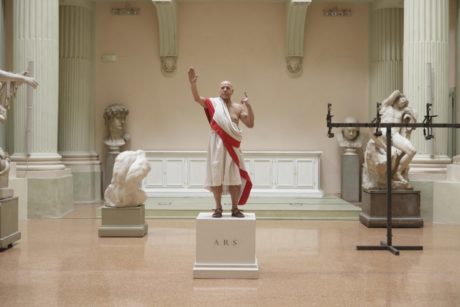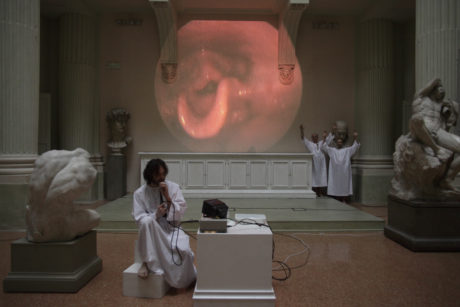A playwright friend recently recalled something the Russian director Dimitry Krymov said: “I want to be interested beyond my understanding. My understanding can catch up later…. The best compliment you will ever get is: I didn’t understand anything, but I found it so interesting.” Although I think I “understood” quite a bit of Romeo Castelluci’s Julius Caesar, Spared Parts, I think this attitude is the best one for approaching Castelluci’s work.

This is a re-envisioned version of the director’s Guilio Cesare, first mounted in 1997. “Spared Parts” is an idea that resonates throughout the 45 minutes of the performance. They are, on one level, the three roles and bits of text preserved from that earlier version. The idea also seems to apply to the voice and the body here.
The production is limited to three actors and two fragments of Shakespeare’s text – a cutting of the first scene and a cutting of Marc Antony’s funeral oration (“Friends, Romans, countrymen . . .”), assisted by two silent actors, two stage hands, and a black stallion.
Although the performance only lasts 45 minutes, I advise wearing comfortable shoes or bringing a cushion: the floor is concrete and no seats are provided.
The most consistently striking aspect of Castelluci’s work for me is his fascination with the extremes of sound. He designs all elements of his productions, and almost everything moment in his productions is either much louder or much quieter than one usually encounters in the theater. The same is true here, and is extends to the human voice.
The three actors portray Caesar (Gianni Plazzi), Mark Antony (Damasio Masini), and “vskij” (Sergio Scarletella). Masini was in the original 1997 version. “vskij” derives his name from a spelling of Stanislavsky, the founder of internalized acting. This is made literal as Scarletella inserts an endoscope down his throat and performs the first scene of Julius Caesar with the English translation superimposed on the projected image of his vocal cords.
Plazzi’s Caesar doesn’t speak at all, but in a magnificently choreographed bit of gesture and recorded sound presents someone a decaying political superman.
The now 75 year old Masini finishes the performance with a version of Antony’s funeral oration for Caesar. Shakespeare’s works emerge as a series of amplified croaks, because Masini has no larynx. His performance and Plazzi’s interweave power and human fragility in a way seldom encountered in the theater. What may be the production’s major theme is expressed in the final words spoken: “Show you . . . poor poor dumb mouths, and bid them speak for me.”

This is the fourth production of Castelluci’s work I have seen: On the Concept of the Face, Regarding the Son of God, and The Four Seasons Restaurant, both presented at FringeArts, as well as watching his Tristan and Isolde stream on my computer. I consider it the strongest of the four.
Running Time: Approximately 45 minutes, with no intermission.
https://vimeo.com/99240051
Julius Caesar, Spared Parts plays through September 24, 2016, at the 2016 Philadelphia Fringe Festival performing at The Navy Yard Building 694 – 1701 Langley Avenue, in Philadelphia, PA. For tickets, call the box office at (215) 413-1318, or purchase them online.
RATING:
BEST OF THE 2016 PHILADELPHIA FRINGE!




